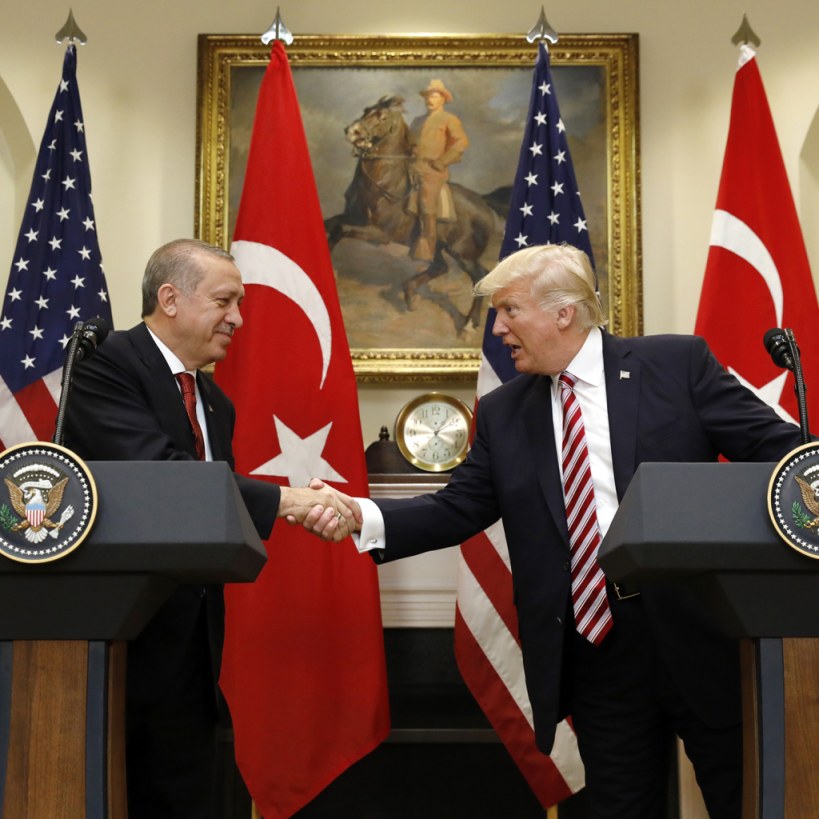Neither Friend nor Foe
The Future of U.S.-Turkey Relations

Overview
The strategic relationship between the United States and Turkey is over. While Turkey remains formally a NATO ally, it is not a partner of the United States. The United States should not be reluctant to oppose Turkey directly when Ankara undermines U.S. policy.
BY
- Steven A. CookEni Enrico Mattei Senior Fellow for Middle East and Africa Studies
“While Turkey remains formally a NATO ally, it is not a partner of the United States,” writes Steven A. Cook in the Council Special Report Neither Friend nor Foe: The Future of U.S.-Turkey Relations. “Unlike in previous eras, Washington and Ankara no longer share overarching threats or interests that bind them together,” Cook notes.
“[President Recep Tayyip] Erdogan’s consolidation of power and corresponding suppression of journalists, academics, civil society organizations, and minorities” contradicts the underlying principles of American society and Turkey’s own North Atlantic Treaty Organization (NATO) membership, Cook writes. Diverging policies and perspectives—such as Turkey’s incursion into northern Syria, its intention to purchase an advanced air defense system from Russia, and the arrest of more than a dozen Americans and three Turks employed by the U.S. embassy—have further widened the chasm between the United States and Turkey.
Cook, the Eni Enrico Mattei senior fellow for Middle East and Africa studies at the Council on Foreign Relations, also details Turkey’s own list of grievances against the United States, including tariffs on Turkish steel and aluminum after an agreement on the release of Pastor Andrew Brunson fell through in the summer of 2018; U.S. military coordination with the People’s Protection Units (YPG), which the Turkish government claims is part of the Kurdistan Workers’ Party (PKK), long designated as a terrorist group by the United States; and the refusal of the United States to extradite Fethullah Gulen, whom Ankara blames for the failed July 2016 coup d’état that killed 249 people.
“It is not clear that even with enough diplomatic tenacity, Washington can rebuild trust and strategic ties with Ankara,” Cook cautions. U.S officials should instead work to “manage the change in U.S.-Turkey relations.” Cook advises U.S. policymakers to take the following steps:
- Recognize that the United States and Turkey have gone from ambivalent allies to antagonists. “Going forward, the United States needs to adjust its expectations, ask for less, and develop other options.”
- Develop alternatives to Incirlik Air Base. “Because Erdogan’s domestic political needs can dictate Turkey’s foreign policy . . . the use of the base to advance U.S. interests is no longer assured. American officials should never again be forced into a position that leaves U.S. security interests vulnerable to the changing interests of Turkish politicians.”
- Reject Turkey’s demands that the United States end its military ties with the YPG. The YPG has been “an effective force fighting the Islamic State and stabilizing northeastern Syria.” For the United States to turn its back on the YPG would give Washington a reputation as an unreliable ally.
- Take a stronger public stand on Turkish policies that undermine U.S. policy. Specifically, “the United States should end its cooperation with Turkey on the F-35 program.” Turkey’s open undermining of U.S. interests and policies cannot continue to go unchecked while Turkey enjoys “the benefits of America’s most advanced military aircraft.”
“Legislators on both sides of the aisle [in the United States] have an opportunity to make Turks aware of Washington’s anger at Ankara’s mistreatment of Americans, its displeasure over a foreign policy at variance with U.S. interests and goals, and its dismay over Turkey’s transformation into an elected autocracy,” writes Cook. “Washington can work with Ankara where it remains possible, work around the Turks where it is necessary, and work against them where it has to,” the author concludes.
Professors: To request an exam copy, contact [email protected]. Please include your university and course name.
Bookstores: To order bulk copies, please contact Ingram. Visit https://ipage.ingrambook.com, call 800.234.6737, or email [email protected]. Include ISBN: 978-0-87609-739-7.t